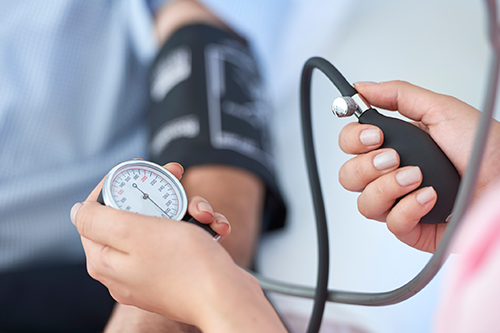A Full Range of Treatments for
Heart Diseases, Disorders, and Issues
At Cardiology Associates of Altoona, we specialize in diagnosing and treating a wide variety of heart-related health issues, disorders, and diseases. Our physicians offer a full range of cardiology services including patient education, disease prevention and control, as well as routine office visits, follow-up care, and specialized services, including corrective procedures.
Learn more about some of the most common heart conditions, and contact our team of dedicated physicians to take control of your health to live life to the fullest.
“Silent Killers”: Coronary Artery Disease, High Cholesterol and
Blood Pressure

Coronary Artery Disease
Coronary Artery Disease is the number one cause of death in the United States for both men and women. This condition begins when cholesterol and plaque accumulate inside the arteries, which leads to atherosclerosis (narrowing and hardening of the arteries). The decreased blood flow limits the heart’s access to the oxygen needed to function properly. There may be no symptoms, therefore it is important for at-risk patients to be screened for the presence of this “silent killer”. When symptoms are present, they are often mild and may include angina (chest pain/discomfort) and arrhythmias (abnormal heartbeats). Without treatment, an affected patient may suffer a heart attack and/or heart failure.
Hypertension
Hypertension (high blood pressure) occurs when the force of blood flowing through your blood vessels remains abnormally high. The best way to test for hypertension is to have your blood pressure checked by a medical professional. Approximately one in three adults have high blood pressure and one in five are unaware that they are affected. Hypertension develops slowly over time and despite many persistent myths, it typically has no obvious symptoms. Know the risk factors for hypertension and take steps to address any factors that you can control.
Hyperlipidemia
While cholesterol is a substance produced by the liver in sufficient quantities for optimal health, an excess consumption of cholesterol in your diet may result in hyperlipidemia (high cholesterol). This condition may result in an accumulation of plaque within artery walls, which decreases effective blood circulation over time. If an arterial plaque breaks open, blood clots are likely to form in the area and may break off and travel to the heart or brain. When a blood clot lodges in an artery of the heart or brain, a heart attack or stroke may occur.
Palpitations, Irregular, Fast, or Slow Heart Rate
Atrial Fibrillation
Atrial Fibrillation (AFib) is an irregular heartbeat. This condition may lead to a variety of dangerous heart complications including stroke, insufficient blood supply, and heart failure. Many people with AFib do not have symptoms. However, when symptoms are present, they may experience a sensation of the heart seeming to “quiver” erratically or chronic fatigue, as blood pools in the heart and fails to squeeze sufficiently to pump blood throughout the body.
Bradycardia
Patients with bradycardia (slow heart rate) may experience fatigue, as well as lightheadedness, confusion, and fainting. This condition may lead to cardiac arrest, heart failure, and chest pain. There are many causes of bradycardia, including medications, sinoatrial node malfunction, hypothyroidism, and heart damage.
Palpitations
Heart palpitations are the sensation that the heart is beating very rapidly and/or irregularly. You may feel like your heart is pumping harder than usual, fluttering, or skipping beats. Heart palpitations may be caused by medication, stress, exercise, and in some case, a serious medical condition. An irregular heartbeat (arrhythmia) may require treatment. In some cases, a more serious heart problem may be indicated by heart palpitations.
Peripheral & Carotid Artery Disease and Valve Disease Symptoms
Peripheral Vascular Disease
Peripheral Vascular Disease, also known as Peripheral Artery Disease (PAD) results in inadequate blood flow to the extremities. The condition is associated with advanced age, tobacco usage, diabetes, obesity, hypertension, hyperlipidemia, and physical inactivity. The most common symptom of PAD is pain and cramping throughout the legs and hips when walking, exercising, climbing stairs, etc. Erectile dysfunction, slow healing wounds, and poor nail growth may also indicate the presence of PAD.
Carotid Artery Disease
Carotid Artery Disease occurs when plaques build up on the interior surfaces of the arterial walls. When left untreated, this disease can lead to a stroke and/or death. As plaque accumulations build up slowly over time, there are often no warning signs.
Valve Disease
Most cases of valve disease are diagnosed after a cardiologist hears a murmur when listening to your heart. If a murmur is suspected to be indicative of a defective heart valve, severe congenital deformity, hole in the septum, or another dangerous condition, proper follow up is necessary to determine if treatment or repair is indicated.
Abdominal Aortic Aneurysm
The aorta is the body’s largest blood vessel. It supplies blood to the entire lower portion of your body (including the legs, pelvis, and abdomen) where many crucial organs are located. Individuals experiencing an abdominal aortic aneurysm (an enlargement of the aorta) may experience symptoms that include: a pulsating sensation near the naval and a deep, constant pain in or near the side of your abdomen, and/or back pain.
Seek emergency medical attention immediately if you suspect that you may be experiencing a life threatening condition. Call 911.
To schedule an appointment, contact Cardiology Associates of Altoona at: (814) 942-2411.

